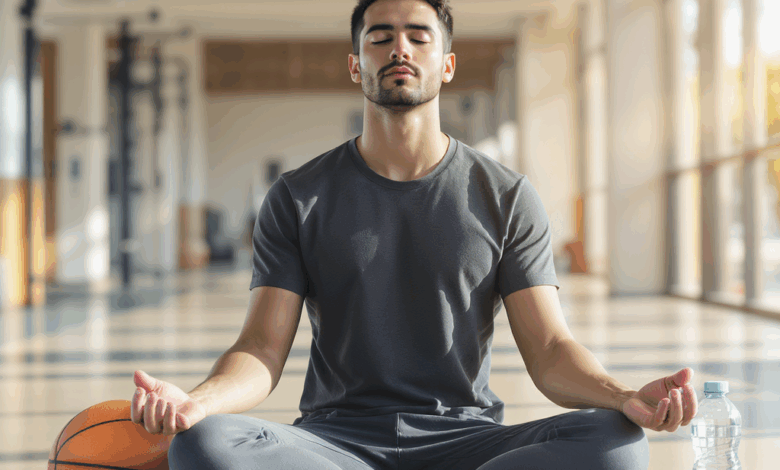Comprehensive Guide to Mental Health Strategies in Competitive Sports

Preparing for Effective Mental Health Support in Competitive Sports
1. Understand the Importance of Mental Health in Sports
- Recognize that mental well-being is as crucial as physical fitness for sustained athletic performance.
- Accept that mental health challenges like stress, anxiety, and post-competition blues are common and manageable.
2. Gather Necessary Support Resources
- Identify mental health professionals such as sports psychologists or counselors.
- Connect with coaches, teammates, family, and support groups to build a reliable support network.
3. Set Up a Comfortable Environment for Practice
- Choose a quiet, distraction-free space for mindfulness and relaxation exercises.
- Ensure access to technology or materials needed for guided meditations or educational content.
4. Learn Basic Mental Health Terminology
- Familiarize yourself with terms like “mindfulness,” “performance decompression,” “stress management,” and “resilience.”
- Understanding these terms helps in effectively following strategies and communicating needs.
5. Prepare a Personal Mental Health Journal or Log
- Use a notebook or digital app to track moods, stressors, goals, and progress.
- This tool aids in self-reflection and identifying patterns or triggers.
Implementing Core Mental Health Strategies for Competitive Athletes
1. Practice Daily Mindfulness and Meditation
a. Start with Short Sessions (5-10 minutes)
- Find a quiet place and sit comfortably.
- Close your eyes and focus on your breathing—inhale deeply and exhale slowly.
- When distracted by thoughts, gently bring attention back to breathing.
b. Use Guided Meditation Apps or Videos
- Select beginner-friendly resources tailored for athletes.
- Follow instructions carefully to maintain focus.
Warning: Avoid forcing relaxation; progress takes time.
2. Set Realistic and Achievable Goals Using the SMART Framework
a. Define Specific Goals
- Clearly state what you want to achieve (e.g., “Improve focus during competitions”).
b. Make Goals Measurable
- Decide how you will track progress (e.g., “Meditate 5 days per week”).
c. Ensure Goals are Achievable
- Be honest about your current capacity and schedule.
d. Keep Goals Relevant
- Align goals with your athletic and personal values.
e. Assign Time-bound Deadlines
- Set reasonable timelines to maintain motivation.
3. Build and Maintain a Strong Support Network
a. Communicate Openly
- Share your mental health goals and challenges with trusted individuals.
b. Schedule Regular Check-ins
- Arrange meetings or calls with coaches, friends, or professionals.
c. Participate in Team-building Activities
- Engage in group exercises that promote trust and understanding.
Warning: Avoid isolating yourself during stress; reach out promptly.
4. Prioritize Rest and Recovery
a. Establish a Consistent Sleep Routine
- Aim for 7-9 hours of quality sleep each night.
b. Incorporate Rest Days in Training
- Plan days with light or no physical activity to allow mental and physical recovery.
c. Engage in Relaxation Activities
- Try hobbies, light reading, or gentle stretching to reduce stress.
5. Seek Professional Mental Health Support When Needed
a. Identify Qualified Professionals
- Look for sports psychologists, counselors, or therapists experienced with athletes.
b. Schedule Consultations
- Arrange initial meetings to discuss concerns and develop personalized strategies.
c. Follow Through with Recommended Plans
- Commit to therapy sessions, coping techniques, or interventions advised by professionals.
Warning: Do not hesitate to ask for help; early intervention improves outcomes.
Verifying and Troubleshooting Your Mental Health Strategy
1. Monitor Your Mental Health Progress
- Regularly review your mental health journal for mood changes and stress levels.
- Note improvements in focus, motivation, and emotional resilience.
2. Adjust Mindfulness and Meditation Practices as Needed
- If sessions feel too challenging, shorten duration or try different techniques.
- Explore various guided meditations until you find what works best.
3. Reassess and Revise Goals Periodically
- Check if goals remain realistic and relevant.
- Modify or set new targets based on current progress and circumstances.
4. Evaluate Support Network Effectiveness
- Reflect on whether your support system provides encouragement and understanding.
- If gaps exist, seek additional connections or professional help.
5. Address Common Challenges
a. Difficulty Maintaining Routine
- Create reminders or integrate mental health practices into daily schedules.
b. Feeling Overwhelmed or Stressed
- Use deep breathing techniques or take short breaks.
- Reach out to your support network immediately.
c. Resistance to Seeking Help
- Remember that mental health is part of overall health.
- Consider that many top athletes openly share their journeys to encourage others.
6. Confirm Success Indicators
- Increased emotional stability and resilience.
- Improved performance consistency under pressure.
- Enhanced ability to cope with setbacks and failures.
- Positive feedback from coaches, teammates, and mental health professionals.
Warning: If mental health worsens or you experience severe symptoms, seek immediate professional assistance.
Checkpoint Summary
- You have prepared by understanding mental health importance and assembling resources.
- You have implemented core strategies including mindfulness, goal setting, support building, rest, and professional help.
- You are actively verifying progress and troubleshooting challenges to ensure sustained mental well-being.
By following this guide, you are equipped to build mental resilience that supports both your competitive ambitions and personal well-being. Remember, mental health strategies are a journey—be patient and compassionate with yourself as you grow stronger step by step.
Integrating Advanced Psychological Conditioning Techniques
Cognitive Behavioral Performance Optimization
Implementing Cognitive Restructuring for Competitive Edge
- Utilize advanced cognitive behavioral therapy (CBT) methods to identify and reframe negative thought patterns that impair performance.
- Employ journaling techniques focused on recognizing cognitive distortions such as catastrophizing or all-or-nothing thinking.
- Integrate behavioral experiments during training to test and challenge limiting beliefs.
Developing Pre-Performance Mental Rehearsal Protocols
- Use vivid imagery to simulate competition scenarios with detailed sensory engagement.
- Incorporate emotion regulation strategies to manage arousal levels during mental rehearsal.
- Schedule regular sessions synchronized with training cycles to enhance neural pathway reinforcement.
Applying Biofeedback and Neurofeedback Tools
- Leverage wearable biofeedback devices to monitor physiological indicators such as heart rate variability (HRV) and galvanic skin response.
- Use neurofeedback to train self-regulation of brainwave patterns linked with focus and relaxation.
- Analyze biofeedback data to refine mental conditioning protocols dynamically.
Advanced Emotional Regulation Strategies
Dialectical Behavior Therapy (DBT) Skills for Athletes
- Train mindfulness beyond basic awareness to include radical acceptance and distress tolerance.
- Implement emotion modulation techniques to effectively navigate high-pressure situations.
- Conduct group DBT-informed workshops for team cohesion and shared emotional intelligence.
Stress Inoculation Training (SIT)
- Design graduated exposure exercises simulating stressors encountered in competition.
- Teach coping self-statements and relaxation techniques tailored to individual stress response profiles.
- Use physiological monitoring to calibrate stress intensity during training.
Enhancing Resilience via Psychological Flexibility
- Promote acceptance and commitment therapy (ACT) principles to foster values-based action despite adversity.
- Develop experiential exercises enhancing cognitive defusion and present-moment awareness.
- Measure resilience metrics periodically to assess growth and recalibrate interventions.
Optimization of Mental Health Support Systems in Athletic Environments
Customizing Mental Health Integration within Training Regimens
Holistic Scheduling of Psychological Interventions
- Integrate mental health sessions seamlessly into physical training calendars to avoid overload.
- Employ periodization principles to time psychological skill acquisition with peak performance phases.
- Use athlete feedback and performance analytics to adapt mental health programming responsively.
Leveraging Multidisciplinary Collaboration
- Establish regular coordination meetings among coaches, mental health professionals, nutritionists, and medical staff.
- Develop shared digital platforms for confidential communication and progress tracking.
- Create contingency plans for acute mental health incidents ensuring swift response and continuity of care.
Advanced Data-Driven Mental Health Monitoring
- Implement validated psychometric tools electronically for real-time mental health assessment.
- Utilize machine learning algorithms to detect early signs of psychological distress from aggregated data.
- Set alert thresholds enabling proactive outreach by mental health teams.
Enhancing Athlete Autonomy through Self-Regulation Technologies
Personalized Mobile Applications for Mental Skills Training
- Deploy apps incorporating adaptive algorithms that tailor exercises based on user performance and mood.
- Include interactive modules for goal-setting, mindfulness, and cognitive restructuring.
- Provide integration with wearable devices for seamless data collection and feedback.
Virtual Reality (VR) for Immersive Mental Conditioning
- Use VR scenarios replicating competition environments to practice coping and focus skills.
- Incorporate biofeedback within VR to teach real-time emotional regulation.
- Evaluate VR training effectiveness with pre- and post-assessment measures.
Automation of Routine Mental Health Check-Ins
- Schedule automated prompts for mood and stress reporting.
- Enable AI-driven conversational agents for initial support and resource guidance.
- Maintain escalation protocols connecting athletes to human professionals when needed.
Expert Troubleshooting and Crisis Management in Athlete Mental Health
Identifying and Managing Complex Psychological Barriers
Detecting Subtle Signs of Burnout and Overtraining Syndrome
- Monitor behavioral changes such as decreased motivation, irritability, and sleep disturbances.
- Correlate psychological symptoms with physiological markers to differentiate burnout from physical fatigue.
- Implement early intervention protocols including workload adjustments and targeted counseling.
Addressing Resistance and Stigma within Athletic Cultures
- Facilitate confidential focus groups to explore barriers to help-seeking.
- Train peer mentors to promote mental health literacy and normalize psychological care.
- Employ motivational interviewing techniques to engage reluctant athletes.
Navigating Comorbid Conditions and Dual Diagnoses
- Collaborate with specialized clinicians to manage co-occurring disorders such as anxiety and substance use.
- Customize treatment plans balancing mental health and performance objectives.
- Monitor medication effects on athletic performance and adjust protocols accordingly.
Crisis Response and Emergency Preparedness
Developing Crisis Intervention Frameworks Specific to Sports Contexts
- Establish clear pathways for immediate response to acute mental health crises.
- Train all staff in mental health first aid and suicide prevention.
- Maintain up-to-date emergency contact lists and referral networks.
Post-Crisis Recovery and Reintegration Strategies
- Implement gradual return-to-training protocols after psychological crises.
- Provide ongoing support through counseling and peer support groups.
- Evaluate recovery outcomes with standardized mental health and performance assessments.
Warning: Advanced mental health techniques require professional supervision and should be implemented by qualified experts to avoid potential harm or exacerbation of symptoms. Always ensure ethical standards and confidentiality are strictly maintained.

Celebrating Your Achievement and Verifying Mastery
Recognizing Your Progress
- Congratulations on completing this comprehensive guide on Mental Health Strategies in Competitive Sports. Your commitment to understanding and applying both foundational and advanced psychological techniques marks a significant step toward building resilience and enhancing athletic performance.
- By engaging with mindfulness, goal-setting, emotional regulation, and professional support frameworks, you have developed a versatile skill set crucial for sustaining mental well-being in competitive environments.
Mastery Verification Checklist
- Can you confidently implement daily mindfulness and meditation tailored to your needs?
- Are you able to set, monitor, and adjust SMART mental health goals effectively?
- Do you maintain and utilize a strong support network including professionals and peers?
- Have you integrated advanced cognitive-behavioral and emotional regulation techniques into your routine?
- Can you recognize signs requiring professional intervention and execute appropriate crisis management strategies?
Pathways for Continued Learning and Skill Development
Expanding Your Psychological Conditioning
- Explore specialized workshops or certifications in sports psychology and cognitive behavioral performance optimization.
- Engage with advanced training in Dialectical Behavior Therapy (DBT), Stress Inoculation Training (SIT), and Acceptance Commitment Therapy (ACT) tailored for athletes.
Enhancing Technology Integration
- Experiment with wearable biofeedback and neurofeedback tools to deepen self-regulation capabilities.
- Incorporate virtual reality (VR) mental conditioning sessions to simulate competition stressors and refine coping strategies.
Building Lifelong Mental Resilience
- Schedule periodic reviews of your mental health journal and goal progress to maintain adaptability.
- Participate in athlete-focused mental health communities to share experiences and gain insights.
Ongoing Support and Troubleshooting Resources
Reliable Sources for Help and Guidance
- Connect with certified sports psychologists and mental health professionals specializing in athlete care.
- Utilize reputable mobile applications offering personalized mental skills training and automated check-ins.
- Access online platforms and forums dedicated to athlete mental health and wellness.
Community and Peer Support
- Join peer mentorship programs to foster encouragement and reduce stigma around mental health challenges.
- Attend team workshops and group sessions focused on emotional intelligence and resilience building.
Crisis and Advanced Troubleshooting
- Keep emergency mental health contact information readily accessible.
- Engage in continued education on recognizing and managing burnout, overtraining, and comorbid conditions.
Remember, mastering mental health strategies is an ongoing journey. With the knowledge and skills you have gained, coupled with these next steps and support systems, you are well-prepared to face challenges confidently and continue growing both as an athlete and an individual.
